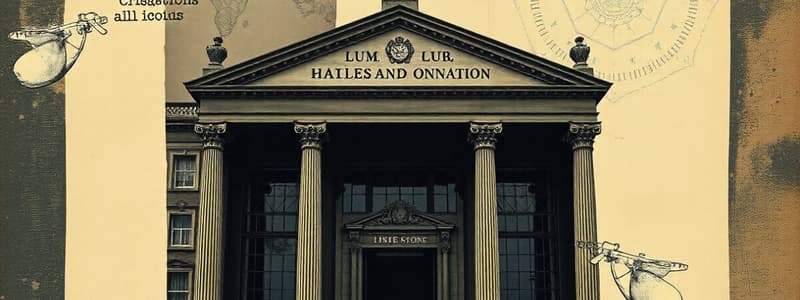Podcast
Questions and Answers
What is the primary goal shared by all court systems, regardless of their differences?
What is the primary goal shared by all court systems, regardless of their differences?
- To ensure cases are processed quickly
- To uphold the law regardless of fairness
- To protect the interests of the state
- To see that justice is done (correct)
In civil actions, the State is always a direct party involved in the case.
In civil actions, the State is always a direct party involved in the case.
False (B)
What is the main objective of a civil claim?
What is the main objective of a civil claim?
To seek compensation or recover money owed.
Which of the following acts is an example of a criminal prosecution?
Which of the following acts is an example of a criminal prosecution?
Criminal prosecutions in Ireland are typically handled by the State through the ______.
Criminal prosecutions in Ireland are typically handled by the State through the ______.
The role of the Director of Public Prosecutions (DPP) is to defend crimes on behalf of the State.
The role of the Director of Public Prosecutions (DPP) is to defend crimes on behalf of the State.
According to the described procedure, what is the first step taken when someone is suspected of committing a crime?
According to the described procedure, what is the first step taken when someone is suspected of committing a crime?
In court listings, what does 'DPP v the named Accused' signify?
In court listings, what does 'DPP v the named Accused' signify?
The legal principle that ensures every accused person is considered innocent until proven guilty is called the ______.
The legal principle that ensures every accused person is considered innocent until proven guilty is called the ______.
Which of the following scenarios might NOT require involvement from the DPP's office?
Which of the following scenarios might NOT require involvement from the DPP's office?
The District Court is the highest court in Ireland.
The District Court is the highest court in Ireland.
Match the following courts with their descriptions:
Match the following courts with their descriptions:
Which court typically handles initial hearings for serious criminal offences?
Which court typically handles initial hearings for serious criminal offences?
If found guilty in District Court, what is the maximum term of imprisonment for a single offence?
If found guilty in District Court, what is the maximum term of imprisonment for a single offence?
In the District Court, a trial is always conducted by a judge and a jury.
In the District Court, a trial is always conducted by a judge and a jury.
Circuit Court offences are referred to as ______, which are formal charges for serious crimes.
Circuit Court offences are referred to as ______, which are formal charges for serious crimes.
How many jurors are typically on a jury in the Circuit Court?
How many jurors are typically on a jury in the Circuit Court?
Which court deals with the most serious criminal offences, such as murder and rape, which the Circuit Court cannot deal with?
Which court deals with the most serious criminal offences, such as murder and rape, which the Circuit Court cannot deal with?
The Special Criminal Court consists of three judges sitting without a ______.
The Special Criminal Court consists of three judges sitting without a ______.
Which legislative act provided for the establishment of the Special Criminal Court?
Which legislative act provided for the establishment of the Special Criminal Court?
The Court of Appeal can only hear appeals from the District Court.
The Court of Appeal can only hear appeals from the District Court.
What is the highest court in Ireland?
What is the highest court in Ireland?
Under which circumstance may the President of Ireland refer a Bill to the Supreme Court?
Under which circumstance may the President of Ireland refer a Bill to the Supreme Court?
In civil actions, the claim that can be dealt with in the Circuit Court does not exceed €______.
In civil actions, the claim that can be dealt with in the Circuit Court does not exceed €______.
The High Court only hears criminal cases.
The High Court only hears criminal cases.
In civil actions, the High Court hears cases where the claim exceeds what amount?
In civil actions, the High Court hears cases where the claim exceeds what amount?
In the court of appeals, what type of document related to the case is read and considered by judges?
In the court of appeals, what type of document related to the case is read and considered by judges?
Which court is a specialised court in Dublin city that aims to treat, rather than imprison, drug addicts?
Which court is a specialised court in Dublin city that aims to treat, rather than imprison, drug addicts?
In civil cases, the 2 parties are prosecution and defendant.
In civil cases, the 2 parties are prosecution and defendant.
Criminal cases must be proven beyond ______.
Criminal cases must be proven beyond ______.
What are some of the conditions that the judge may impose, when a person is released on bail?
What are some of the conditions that the judge may impose, when a person is released on bail?
What happens to bail money if the defendant appears for trial on the appointed day?
What happens to bail money if the defendant appears for trial on the appointed day?
Match the cases:
Match the cases:
The Gardaí decision to object to bail, is always followed by a judge.
The Gardaí decision to object to bail, is always followed by a judge.
If the judge refuses bail, the accused is ______ in custody.
If the judge refuses bail, the accused is ______ in custody.
Flashcards
Criminal Justice System Purpose?
Criminal Justice System Purpose?
To punish guilty parties, deter others, and protect society.
Civil Actions
Civil Actions
Actions taken by individuals against other individuals or organizations, where the State is not involved.
Criminal Prosecutions
Criminal Prosecutions
Cases handled by the State, prosecuting illegal acts like murder, theft and robbery, aiming to punish via jail or fines.
Role of the DPP?
Role of the DPP?
Signup and view all the flashcards
Five Types of Irish Courts?
Five Types of Irish Courts?
Signup and view all the flashcards
District Court Civil Authority?
District Court Civil Authority?
Signup and view all the flashcards
District Court Penalties?
District Court Penalties?
Signup and view all the flashcards
Circuit Court Criminal Role?
Circuit Court Criminal Role?
Signup and view all the flashcards
Circuit Court Case Level?
Circuit Court Case Level?
Signup and view all the flashcards
Central Criminal Court Role?
Central Criminal Court Role?
Signup and view all the flashcards
Special Criminal Court
Special Criminal Court
Signup and view all the flashcards
Court of Appeal Function?
Court of Appeal Function?
Signup and view all the flashcards
Supreme Court Function?
Supreme Court Function?
Signup and view all the flashcards
District Court Civil Matters?
District Court Civil Matters?
Signup and view all the flashcards
Circuit Court Civil Law?
Circuit Court Civil Law?
Signup and view all the flashcards
High Court Civil Role?
High Court Civil Role?
Signup and view all the flashcards
Civil Court of Appeal Purpose?
Civil Court of Appeal Purpose?
Signup and view all the flashcards
Supremacy?
Supremacy?
Signup and view all the flashcards
Children Court
Children Court
Signup and view all the flashcards
Drug Treatment Court
Drug Treatment Court
Signup and view all the flashcards
Criminal Law Parties
Criminal Law Parties
Signup and view all the flashcards
Civil Law Parties?
Civil Law Parties?
Signup and view all the flashcards
Criminal Case Outcome?
Criminal Case Outcome?
Signup and view all the flashcards
Civil Case Outcome?
Civil Case Outcome?
Signup and view all the flashcards
Criminal Cases Burden?
Criminal Cases Burden?
Signup and view all the flashcards
Burden of Proof?
Burden of Proof?
Signup and view all the flashcards
Bail Definition?
Bail Definition?
Signup and view all the flashcards
Requirements for Bail?
Requirements for Bail?
Signup and view all the flashcards
Accused fails to show?
Accused fails to show?
Signup and view all the flashcards
Judge Additional Conditions?
Judge Additional Conditions?
Signup and view all the flashcards
What happens if judge refuses bail?
What happens if judge refuses bail?
Signup and view all the flashcards
Gardai object to bail?
Gardai object to bail?
Signup and view all the flashcards
Study Notes
How the Court System Works
- Each country has its own court system with the shared goal of ensuring justice.
- In Ireland, the court system deals with civil actions and criminal prosecutions.
- The court ensures outcomes are fair and reasonable in all cases.
Purpose of the Criminal Justice System
- To punish guilty parties.
- To act as a deterrent to others.
- To protect society.
Civil Actions
- Civil actions are taken by individuals or organizations against other individuals or organizations.
- The State does not generally participate in civil actions.
- Civil cases include personal injury claims, breach of contract actions, and disputes over rights of way or planning permission.
- Civil claims seek compensation or recovery of money owed.
Criminal Prosecutions
- Criminal prosecutions are handled by the State through the Director of Public Prosecutions (DPP).
- Criminal prosecutions deal with illegal acts like murder, rape, theft, and robbery.
- The purpose of criminal law is to punish offenders through jail sentences or fines.
- Minor cases are decided by a judge alone, while serious criminal offenses, along with civil cases like libel and slander, are tried by a judge and jury.
- In jury trials, the judge guides the jury on legal matters, and the jury decides the facts and returns the verdict.
Director of Public Prosecutions (DPP)
-
The DPP prosecutes crimes in the name of the State.
-
Typical procedure:
-
Arrest: Gardaí arrest and charge a suspect
-
Evidence: Gardaí collect evidence which is compiled into a 'Book of Evidence' and submitted to the DPP.
-
Prosecution Decision: The DPP decides whether sufficient evidence exists to prosecute.
-
Court Listing: If prosecuted, the case is listed as "DPP v the named Accused" ('v' means 'versus' or against).
-
If suspected of a crime, the State brings them to court.
-
The principle of Presumption of Innocence applies.
-
Very minor offenses do not need to go to the DPP's office.
How the Courts Work
- Ireland has five court types in a hierarchy: District Court, Circuit Court, High Court, Court of Appeal, and Supreme Court; each court deals with specific cases.
- Courts like the Special Criminal Court have specific roles and operate alongside the other courts.
Criminal – 1. District Court
-
The District Court is organized locally and handles civil actions with compensation claims not exceeding €15,000.
-
It handles liquor licensing cases, family law cases, custody, maintenance of children, and barring orders.
-
It deals with criminal matters like drunk driving, speeding, assault, and criminal damage and the initial hearings of serious offenses to be tried in the higher courts.
-
A judge presides in District Court cases.
-
Consumers can use the small claims procedure in the District Court to recover sums up to €2,000.
-
Usual penalties if found guilty:
-
Imposition of a fine.
-
Community service order.
-
Imprisonment of up to one year for a single offense or two years cumulatively.
-
Presumption of Innocence is a core underlying legal principle.
-
Guilty parties may receive a binding order to keep the peace for a stated period.
-
An accused person may plead GUILTY or NOT GUILTY, opting for a trial in the District Court.
-
There is no jury at the District Court level; trial by jury only occurs in higher courts.
Criminal – 2. Circuit Court
- The Circuit Court is organized regionally.
- In criminal matters, a judge and jury preside and can deal with all but the most serious offenses such as murder and rape.
- Hears appeals from the District Court in civil and criminal matters.
- Deals with crimes too serious for the District Court.
- Circuit Court offenses are considered Indictable Offenses.
- A Jury consists of 12 Jurors chosen randomly from the Register of Electors.
- Judges can impose higher imprisonment terms than the District Court, without a strict upper limit beyond relevant legislation.
Criminal – 3. Central/Special Criminal Court
-
The High Court, when dealing with criminal cases, is known as the Central Criminal Court.
-
It tries the most serious criminal offences (indictable offenses), such as murder and rape, which the Circuit Court cannot deal with; cases are tried by a judge and jury.
-
The Court sat only in Dublin until recently, but now sits in Cork, Limerick, Sligo, Waterford, Naas, and Castlebar.
-
It is the highest criminal court in the country.
-
Imprisonment terms for guilty parties is defined in legislation.
-
A judge in a Preliminary Hearing at District Court determines the appropriate court for a case.
The Special Criminal Court
- Consists of three judges without a jury.
- Deals mostly with criminal charges involving terrorist organizations and organized crime.
- The Government established the court to hear cases that ordinary courts might be unable to deal with due to possible jury intimidation.
- The Offences Against the State Act 1939 provided for its establishment.
4. Criminal – Court of Appeal
- Hears appeals in criminal cases from the Circuit Court, Central Criminal Court, or Special Criminal Court.
- Rules on questions of law raised in the Circuit Court.
5. Criminal – Supreme Court
- The Supreme Court is the highest court in Ireland.
- Hears appeals from the Court of Appeal and the High Court in defined constitutional circumstances.
- Under Article 26, the President of Ireland can refer any Bill passed by the Oireachtas to the Supreme Court to decide its constitutionality.
Civil – 1. District Court
- The District Court is organized locally and handles civil actions where compensation claimed does not exceed €15,000.
- It also handles liquor licensing cases, a wide range of family law cases, custody and maintenance of children, and applications for barring orders.
- Deals with criminal matters such as drunk driving, speeding, assault, criminal damage and the initial hearings of serious offences to be tried in the higher courts.
- Consumers can use the small claims procedure in the District Court to recover sums up to €2,000.
Civil – 2. Circuit Court
- Organized on a regional basis.
- Deals with civil cases not exceeding €75,000 and also deals with some liquor licensing cases and family law cases including divorce and judicial separation.
- Hears appeals from the District Court in civil and criminal matters.
Civil – 3. High Court
- Based in Dublin, has the power to hear all criminal and civil matters (including family law cases), but usually hears only cases that cannot be dealt with by the lower courts.
- Hears civil actions where the claim exceeds €38,000.
- The High Court also hears appeals from the Circuit Court in civil matters and can give rulings on questions of law raised in the District Court.
Civil-4. Court of Appeal
- Hears appeals in civil cases from the High Court.
- It can also give rulings on questions of law raised in the Circuit Court.
- Consists of 3 judges.
- An appeal does not mean a full rehearing of the case; the court transcripts (detailed written reports) are read and considered by appeals judges.
Civil-5. Supreme Court
- The Supreme Court is the highest court in Ireland.
- It hears appeals from the Court of Appeal and the High Court in the limited circumstances set out in the Constitution.
- Under Article 26 of the Irish Constitution, the President of Ireland may refer any Bill passed by the Oireachtas to the Supreme Court to decide whether it is unconstitutional.
Other Courts in Ireland
- The Children Court:
- The District Court can try a child or a young person for any offence except homicide.
- In Cork, Limerick and Waterford, the Children Court of the District Court deals with charges against children under 16 years of age, except where the charges are very serious or where the judge thinks there are special circumstances.
- The Children Court is held in the courtrooms where the ordinary sittings of the District Court are held and in Dublin there is a separate Children Court which sits every working day.
- At other venues, charges against children are heard in a different area to the ordinary sittings, or on different days or times, and is called a Juvenile Court.
Drug Treatment Court
- The Drug Treatment Court is a specialised court in Dublin that aims to treat, rather than imprison, drug addicts.
- Deals with non-violent offenders whose offending behaviour is motivated by their addiction rather than for financial gain.
- Aims to provide long-term court-supervised treatment for offenders involved in drug abuse.
- By addressing the addiction, the underlying reason for the offending is removed.
Differences Between Criminal & Civil
- Criminal Law:
- The parties involved are Prosecution (DPP) v Defendant.
- The outcome is a Guilty or Not Guilty verdict; if guilty, the judge decides punishment.
- Criminal cases must be proven beyond a reasonable doubt.
- If there is a reasonable doubt about the defendant's guilt, they must be found not guilty.
- Civil Law:
- The parties involved are Plaintiff v Defendant (Respondent).
- The DPP is not generally involved in civil cases.
- The outcome is that the Plaintiff will either Win or Lose the case.
- The remedy, if successful, is usually Damages (Compensation) awarded to the Plaintiff.
- Civil Cases are decided on the balance of probabilities – ‘more likely than not’
Bail
- When a person appears before the court charged with a crime, the judge may release them on bail under certain conditions.
- Conditions vary but usually the accused has to contribute their own bail and an Independent Surety is normally required.
- Failure to show leads to bail forfeiture; appearance leads to bail return and aims to "guarantee" the accused's appearance.
- Other possible conditions: surrender of passport and signing on at local Garda station at stated intervals.
- If bail is refused, the accused is remanded in custody until the court date.
- Gardaí can object to bail, but the judge does not have to follow the recommendation.
Studying That Suits You
Use AI to generate personalized quizzes and flashcards to suit your learning preferences.




